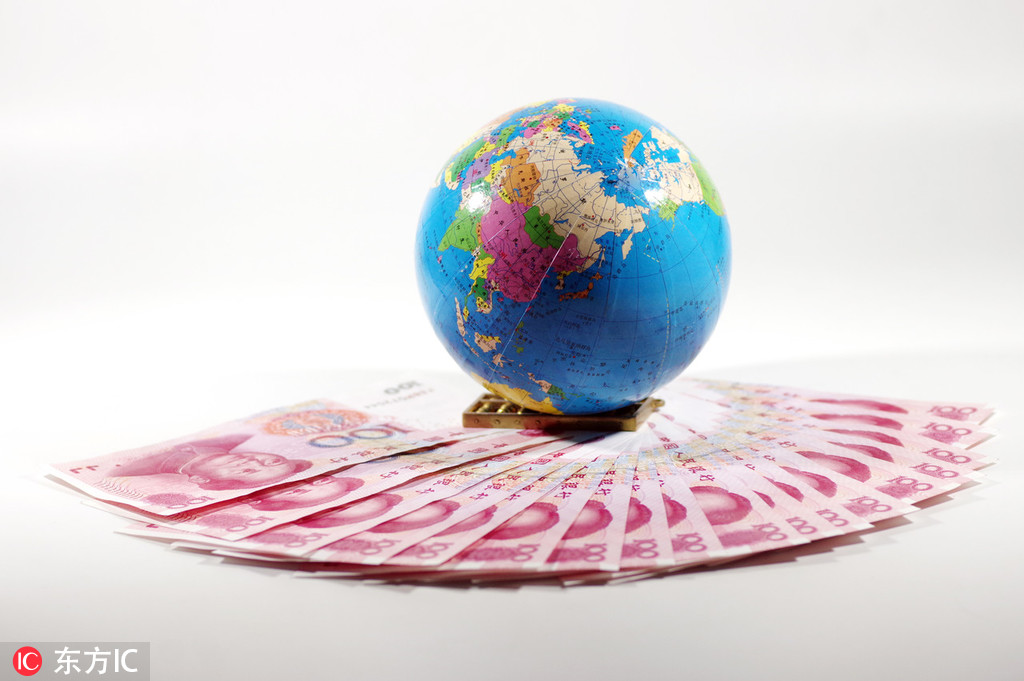Chinese currency's long journey of internationalization


GUANGZHOU - About 200 years ago, European merchants took tons of silver coins and sailed thousands of kilometers to southern China's Guangzhou to buy tea, silk and porcelain.
The silver coins were later made into silver ingots and handed over as tax to the royal court in Beijing.
Such silver ingots are now displayed at the Guangdong Customs Museum in the city of Guangzhou, which offers a glimpse into China's early relations with Western money and Chinese currency's long journey of internationalization.
Guangzhou has been China's foreign trade hub for more than 2,000 years. Between the mid-18th century and mid-19th century, the Qing Dynasty (1644-1911) government set Guangzhou as the only trading place for European merchants. As a result, a tremendous amount of currencies were swapped here.
At the same time, Chinese residents used silver ingots to trade for goods, which came from different workshops and varied in weight and color.
Thus, the profession of silver inspector was created to solve the disparity. Their job was to examine silver currencies used in transactions and decide what value they held.
To streamline the money exchange process, in the late 19th century, the Qing government set up factories to produce standardized silver coins. The designers even put English words on the rim of the Chinese coins, expecting their use in foreign trade.
Thanks to decades of reform and opening-up, China has now become the world's largest trading entity, and Guangzhou is a leading export port for China's industrial products.
A new currency exchange reform is taking place. In 2009, China started a pilot program to use the Chinese currency renminbi in cross-border trade settlement. Home to many trading firms, Guangzhou was nominated as the first pilot city, along with Shanghai and four other cities in Guangdong.
Midea Group, China's home appliance giant, was quick to benefit from the pilot program.
Based in Foshan, which neighbors Guangzhou, Midea has over 200 subsidiaries, 60 branches and 10 strategic partners around the globe.
Under the pilot program, Midea is increasingly using renminbi to directly settle with foreign companies, said Ann Yao, general manager of Midea Group Finance Co Ltd.
"For example, in the past, our customers in Thailand had to swap Thai Baht into US dollars. Then we swapped US dollars to renminbi. Now, our clients simply need to swap Thai Baht to renminbi. By doing so, settlement efficiency is increased and risks of exchange rate fluctuation are reduced," Yao said.
Yao said renminbi settlement has been accepted by more overseas customers in recent years. "The main reason is that the renminbi has a relatively stable exchange rate. Moreover, there are more and more banks that do renminbi settlement in foreign countries, so it is getting easier for customers to acquire," she added.
Kingfa Sci & Tech Co Ltd a new materials company, whose new plastic products are widely used in things such as biodegradable plastic bags and fire-resistant car materials, is also a beneficiary.
Six years ago, Kingfa chose India as the first destination of its overseas expansion. Renminbi settlement allowed it to acquire a stagnant local company without worrying about exchange rate risks.
"We made a comparison when deciding whether to invest through renminbi, US dollars, or Indian rupee. We found that renminbi has the smallest fluctuation, so we chose it for the acquisition," said Xing Longyu, a treasurer at the company.
Today, the subsidiary has grown into the largest modified plastics producer in India, with sales surpassing 60,000 tons in 2018.
"In recent years, many of our foreign partners offered to settle with us in renminbi. They told us that the main reason for choosing renminbi is its stability," he added.
Renminbi is landing in more overseas markets as more Chinese companies embrace international trade. And more importantly, choosing renminbi settlement is a vote of confidence in China's open and strong economy.
"After the global financial crisis, China's economy has maintained fast and stable growth. China has acted as a stabilizer to the world economy, which in turn gained more confidence in the Chinese economy and renminbi," said Liu Qiuru, deputy chief of an office in charge of cross-border yuan trade settlement, under the People's Bank of China Guangzhou Branch.
In August, the international financial transaction agency SWIFT (the Society for Worldwide Interbank Financial Telecommunications) set up a wholly-owned enterprise in Beijing, accepting renminbi as the third international currency after the dollar and the euro.
As China deepens its reform and opening up, Chinese currency's long journey of internationalization continues. The more extensive use of renminbi brings China and its development opportunities closer to the rest of the world.



































